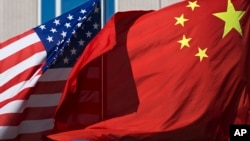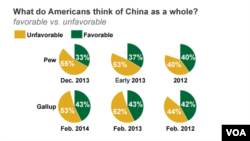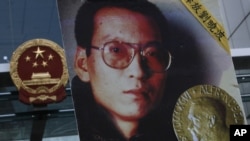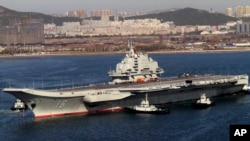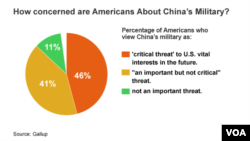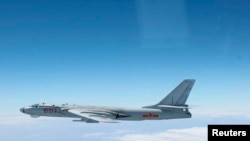WASHINGTON DC —
Editor’s Note: Looking through VOA's listener mail, we came across a letter that asked a simple question. "What do Americans think about China?" We all care about the perceptions of others. It helps us better understand who we are. VOA Reporter Michael Lipin begins a series providing some answers to our listener's question. His assignment: present a clearer picture of what Americans think about their chief world rival, and what drives those perceptions.
Two common American attitudes toward China can be identified from the latest U.S. public opinion surveys published by Gallup and Pew Research Center in the past year.
First, most of the Americans surveyed have unfavorable opinions of China as a whole, but do not view the country as a threat toward the United States at the present time.
Second, most survey respondents expect China to pose an economic and military threat to the United States in the future, with more Americans worried about the perceived economic threat than the military one.
Most Americans view China unfavorably
To understand why most Americans appear to have negative feelings about China, analysts interviewed by VOA say a variety of factors should be considered. Primary among them is a lack of familiarity.
"Most Americans do not have a strong interest in foreign affairs, Chinese or otherwise," says Robert Daly, director of the Kissinger Institute on China and the United States at the Washington-based Wilson Center.
Many of those Americans also have never traveled to China, in part because of the distance and expense. "That means that like most human beings, they take short cuts to understanding China," Daly says.
Rather than make the effort to regularly consume a wide range of U.S. media reports about China, analysts say many Americans base their views on widely-publicized major events in China's recent history.
"The Chinese government's image took a huge hit in the eyes of Americans after the 1989 Tiananmen Square massacre (of student protesters by Chinese troops), and it has not really recovered since," says David Wertime, senior editor at Foreign Policy magazine.
Daly says American attitudes also have been influenced more recently by Beijing's refusal to release jailed dissident Liu Xiaobo. The human rights advocate won the 2010 Nobel Peace Prize, but remained imprisoned by China's Communist rulers for perceived subversive activities.
"Americans, by and large, are uncomfortable with authoritarianism," says Daly.
He says many Americans also lack understanding of China's human rights progress in recent decades. "It is nowhere near the level of freedom that Americans enjoy, but there have been enormous gains in the health and well-being of the Chinese people," he says.
U.S. media coverage of China also tends to emphasize conflictual elements in U.S.-China relations, says Elizabeth Economy, a Council on Foreign Relations analyst in New York.
She says these elements include disagreements between the U.S. and Chinese governments in how to resolve international conflicts and economic disputes about cyber security and intellectual property rights.
"In some matters, China acts unilaterally, while in others, it does not act in concert with the United States," Economy says. "(As a result,) there is a sense that the United States does not have much leverage with China."
Most Americans see China as benign
U.S. opinions on China are more positive when Americans are asked the narrower question of how they characterize Beijing's relationship with Washington.
Polls show that most Americans appear to view China either as friendly to the United States, or as neither a partner nor an enemy.
Analysts say many Americans see little risk of attack or invasion by China, which has never been at war with the United States.
Former U.S. state and defense department official Leslie Gelb, also a president emeritus of the Council on Foreign Relations, says China is the first major world power in history to fall short of being a global military power.
"China's military power is pretty much restricted to its own borders and shores. The United States is a global military power, and they are just a power in their area," says Gelb.
He notes that China's 2014 defense budget of $132 billion is only about one-quarter of U.S. government spending on defense this year ($496 billion).
"We can put modern aircraft carriers into the (Asia-Pacific) area. They are backwards in the most important naval kind of power," Gelb says.
China's only aircraft carrier, the Liaoning, was commissioned in 2012. The United States has 11 aircraft carriers in active service.
Daly of the Wilson Center says another reason for the perception of China as benign is that many Americans are unaware of U.S. interests in Asia, where Beijing has become more assertive in maritime territorial disputes with U.S. allies such as Japan.
One of the disputes involves a group of East China Sea islands administered by Japan and claimed by China, which has increased aerial and naval patrols of the surrounding waters in recent years. The islands are known as Senkaku in Japanese and Diaoyu in Chinese.
"When Americans hear words like Senkaku and Diaoyu, they think, this has nothing to do with me," Daly says. "It is questionable if Americans realize what it would mean for the United States and other countries should China become the hegemon of the Western Pacific."
Most Americans see China's military as a threat
Daly says many Americans also have no idea about China's current defense capabilities. But, Gallup says most respondents see the Chinese military as a threat to the United States in the future, with 87 percent labelling that threat as "important" or "critical."
China has been rapidly expanding its defense spending, with this year's figure ($132 billion) marking a 12 percent increase on the year before.
"That is far greater than any other country," says Gelb. "So Americans and particularly China's neighbors are beginning to get nervous. And those neighbors have started poking at us (the United States) to protect their (maritime territorial) rights in the region."
Most Americans see China's economy as a threat
Polls show most Americans also see China posing an economic threat to the United States in the coming years. China is the United States' second largest trading partner, third largest market for U.S. exports, and biggest source of U.S. imports.
Council on Foreign Relations analyst Economy says U.S. media often portray China with a lot of hype, emphasizing its status as the largest foreign holder of U.S. debt.
"The media also have a tendency to frame U.S.-China economic issues as competitive," she says. "So (they ask,) 'who is winning the clean energy race?', or 'whose infrastructure is better?'"
Gallup and Pew Research say about half of Americans believe China's economy already is the world's biggest, even though it has yet to surpass the United States.
But, China's gross domestic product grew 7.7 percent last year, much faster than the U.S. growth of 1.9 percent.
Daly says the Chinese economy will become the largest in absolute terms in the "not too distant future." He says that prospect worries many Americans who believe their nation should remain the most powerful.
"Americans have a fairly deep and broad fear of the United States losing its global primacy, and China is the primary candidate for taking its place," he says.
A. Michael Spence, winner of the 2001 Nobel Prize in economics, says Americans also tend to see the rise of developing countries like China as the main cause of U.S. unemployment and income distribution problems.
"The evidence is that these (problems) are related to both technology and globalization, but globalization (and China) get most of the attention," Spence says. "One strand of thought also says (the Chinese) are hurting (the United States) because they exploit workers and have unsafe and environmentally unsound (working) conditions."
Gallup says more Americans rate China's economy as a "critical" threat to the United States than those who see the Chinese military posing the same threat. Analysts say that is because China's impact on the U.S. job market feels more immediate to Americans than Chinese military moves in Asia.
What Do Americans think of the Chinese people?
The Gallup and Pew Research surveys did not ask respondents to distinguish between China's people and its Communist rulers.
Wertime, also co-founder of China blog Tea Leaf Nation, says making that distinction could result in very different answers.
"It is possible for an American to feel that the people of China are favorably disposed (toward Americans), and not to have a good image of the Chinese government," he says.
VOA will examine that issue and other aspects of U.S. attitudes toward China as this series progresses.

Michael Lipin was born in the United States, grew up in Hong Kong, was educated at Oxford, and returned to Hong Kong to begin his reporting career. In the decade after Hong Kong’s handover from Britain to China, he covered economics for The Standard newspaper, was a writer and producer for CNN International, and a producer and host for ATV, Asia Television. He joined VOA in its Hong Kong bureau in 2005 and moved to VOA/Washington in 2007, where he is a reporter and program host.
Two common American attitudes toward China can be identified from the latest U.S. public opinion surveys published by Gallup and Pew Research Center in the past year.
First, most of the Americans surveyed have unfavorable opinions of China as a whole, but do not view the country as a threat toward the United States at the present time.
Second, most survey respondents expect China to pose an economic and military threat to the United States in the future, with more Americans worried about the perceived economic threat than the military one.
Most Americans view China unfavorably
To understand why most Americans appear to have negative feelings about China, analysts interviewed by VOA say a variety of factors should be considered. Primary among them is a lack of familiarity.
"Most Americans do not have a strong interest in foreign affairs, Chinese or otherwise," says Robert Daly, director of the Kissinger Institute on China and the United States at the Washington-based Wilson Center.
Many of those Americans also have never traveled to China, in part because of the distance and expense. "That means that like most human beings, they take short cuts to understanding China," Daly says.
Rather than make the effort to regularly consume a wide range of U.S. media reports about China, analysts say many Americans base their views on widely-publicized major events in China's recent history.
"The Chinese government's image took a huge hit in the eyes of Americans after the 1989 Tiananmen Square massacre (of student protesters by Chinese troops), and it has not really recovered since," says David Wertime, senior editor at Foreign Policy magazine.
Daly says American attitudes also have been influenced more recently by Beijing's refusal to release jailed dissident Liu Xiaobo. The human rights advocate won the 2010 Nobel Peace Prize, but remained imprisoned by China's Communist rulers for perceived subversive activities.
"Americans, by and large, are uncomfortable with authoritarianism," says Daly.
He says many Americans also lack understanding of China's human rights progress in recent decades. "It is nowhere near the level of freedom that Americans enjoy, but there have been enormous gains in the health and well-being of the Chinese people," he says.
U.S. media coverage of China also tends to emphasize conflictual elements in U.S.-China relations, says Elizabeth Economy, a Council on Foreign Relations analyst in New York.
She says these elements include disagreements between the U.S. and Chinese governments in how to resolve international conflicts and economic disputes about cyber security and intellectual property rights.
"In some matters, China acts unilaterally, while in others, it does not act in concert with the United States," Economy says. "(As a result,) there is a sense that the United States does not have much leverage with China."
Most Americans see China as benign
U.S. opinions on China are more positive when Americans are asked the narrower question of how they characterize Beijing's relationship with Washington.
Polls show that most Americans appear to view China either as friendly to the United States, or as neither a partner nor an enemy.
Analysts say many Americans see little risk of attack or invasion by China, which has never been at war with the United States.
Former U.S. state and defense department official Leslie Gelb, also a president emeritus of the Council on Foreign Relations, says China is the first major world power in history to fall short of being a global military power.
"China's military power is pretty much restricted to its own borders and shores. The United States is a global military power, and they are just a power in their area," says Gelb.
He notes that China's 2014 defense budget of $132 billion is only about one-quarter of U.S. government spending on defense this year ($496 billion).
"We can put modern aircraft carriers into the (Asia-Pacific) area. They are backwards in the most important naval kind of power," Gelb says.
China's only aircraft carrier, the Liaoning, was commissioned in 2012. The United States has 11 aircraft carriers in active service.
Daly of the Wilson Center says another reason for the perception of China as benign is that many Americans are unaware of U.S. interests in Asia, where Beijing has become more assertive in maritime territorial disputes with U.S. allies such as Japan.
One of the disputes involves a group of East China Sea islands administered by Japan and claimed by China, which has increased aerial and naval patrols of the surrounding waters in recent years. The islands are known as Senkaku in Japanese and Diaoyu in Chinese.
"When Americans hear words like Senkaku and Diaoyu, they think, this has nothing to do with me," Daly says. "It is questionable if Americans realize what it would mean for the United States and other countries should China become the hegemon of the Western Pacific."
Most Americans see China's military as a threat
Daly says many Americans also have no idea about China's current defense capabilities. But, Gallup says most respondents see the Chinese military as a threat to the United States in the future, with 87 percent labelling that threat as "important" or "critical."
China has been rapidly expanding its defense spending, with this year's figure ($132 billion) marking a 12 percent increase on the year before.
"That is far greater than any other country," says Gelb. "So Americans and particularly China's neighbors are beginning to get nervous. And those neighbors have started poking at us (the United States) to protect their (maritime territorial) rights in the region."
Most Americans see China's economy as a threat
Polls show most Americans also see China posing an economic threat to the United States in the coming years. China is the United States' second largest trading partner, third largest market for U.S. exports, and biggest source of U.S. imports.
Council on Foreign Relations analyst Economy says U.S. media often portray China with a lot of hype, emphasizing its status as the largest foreign holder of U.S. debt.
"The media also have a tendency to frame U.S.-China economic issues as competitive," she says. "So (they ask,) 'who is winning the clean energy race?', or 'whose infrastructure is better?'"
Gallup and Pew Research say about half of Americans believe China's economy already is the world's biggest, even though it has yet to surpass the United States.
But, China's gross domestic product grew 7.7 percent last year, much faster than the U.S. growth of 1.9 percent.
Daly says the Chinese economy will become the largest in absolute terms in the "not too distant future." He says that prospect worries many Americans who believe their nation should remain the most powerful.
"Americans have a fairly deep and broad fear of the United States losing its global primacy, and China is the primary candidate for taking its place," he says.
A. Michael Spence, winner of the 2001 Nobel Prize in economics, says Americans also tend to see the rise of developing countries like China as the main cause of U.S. unemployment and income distribution problems.
"The evidence is that these (problems) are related to both technology and globalization, but globalization (and China) get most of the attention," Spence says. "One strand of thought also says (the Chinese) are hurting (the United States) because they exploit workers and have unsafe and environmentally unsound (working) conditions."
Gallup says more Americans rate China's economy as a "critical" threat to the United States than those who see the Chinese military posing the same threat. Analysts say that is because China's impact on the U.S. job market feels more immediate to Americans than Chinese military moves in Asia.
What Do Americans think of the Chinese people?
The Gallup and Pew Research surveys did not ask respondents to distinguish between China's people and its Communist rulers.
Wertime, also co-founder of China blog Tea Leaf Nation, says making that distinction could result in very different answers.
"It is possible for an American to feel that the people of China are favorably disposed (toward Americans), and not to have a good image of the Chinese government," he says.
VOA will examine that issue and other aspects of U.S. attitudes toward China as this series progresses.

Michael Lipin was born in the United States, grew up in Hong Kong, was educated at Oxford, and returned to Hong Kong to begin his reporting career. In the decade after Hong Kong’s handover from Britain to China, he covered economics for The Standard newspaper, was a writer and producer for CNN International, and a producer and host for ATV, Asia Television. He joined VOA in its Hong Kong bureau in 2005 and moved to VOA/Washington in 2007, where he is a reporter and program host.




